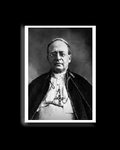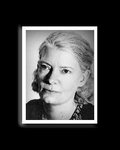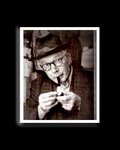Sunday, September 23, 2007
Busy
Saturday, September 15, 2007
Vintage Distributism
by Fr. Vincent McNabb

Readers, and especially Distributist readers, of G.K.'s Weekly, must share the good news that has come to re-kindle the fires of Distributist hope. Before me, as I write, there lies a new journalistic venture called, convincingly, Land for the People. Its title-page tells us that it is the Organ of the Scottish Catholic Land Association, and that its editor is one not unknown to G.K.'s Weekly, the Rev. John McQuillan, D.D.
I think I am speaking the mind of the Editor of the organ, who is also President of the Association in saying that the Association has come of a conviction that the withered hand can be cured only by being stretched out. Propaganda by the spoken and the written word is of (chronologically) first importance, because "in the beginning is the word." But in practical matter words must end in deeds, because the doing of the work is of (really) first importance. To quote the wise wisdom of Aquinas; "Finis est principium in operabilibus" (in practical matter the end is the principle).
It was easy to see but hard to accept the fact that if Distributist energy was to be expended merely on the spoken or written word, the enemy could quietly advance its fighting line and halve its fighting forces. Distributism, in order to live, had to take action.
Only two forms of action promised victory. Distributists could take political action, or both political and economic action. Moreover, that action to be effective would have to be taken at once against an enemy always alertly active and now entrenched in an almost impregnable position. What Soviet Russia is now attempting as a mere experiment in Marxian Socialism England, may be driven to attempt, as the last effort, to prevent destruction. Mass production with collective, servile labour is being applied to Russian agriculture, not in order to justify Russian Marxian Socialists. But English and Scottish agriculture, with all its attendant crafts, is in such a state of ruin that, all other experiments having failed, no argument could be urged against the methods of Big Business, Mass Production and Servile Labour.
To some Distributists a campaign of mere words seemed as helpful for economic salvation as the fiddling of Nero was helpful when Rome was burning. Something, of course, had to be said: indeed, something had to be said again and again and again. Thank God, G.K.'s Weekly was saying it, with an emphasis and distinction which gave it a place apart in journalism.
But something had to be done as well as said, if only to justify what was being said by the men whose craft was the word and the saying of the word. We, pulpit-craftsmen of the world, know how useless would be the best of all we say if nowhere in the world there were homes and cloisters living in the principles that are proved only by being lived.
It is to the credit of the Scottish Catholic Land Association that, leaving Distributist political action to others, they have determined to face salvation by taking economic action by leading men, women and children from the dens of Glasgow to the glens of Scotland.
Though nt all, nor perhaps not many, of the Scottish Land Association are Distributists, yet the starting-force of the Association was a borrowing from Distributism. How much the Association already owes to its first President it can hardly be expected to know. Nor again can the President know the extent of his indebtedness to the group of writers and thinkers that ahve made their orbit round G.K.'s and its two predecessors.
But the President and his fellow-Distributists have thought their best repayment of their borrowings was to do in Scotland what their creditors were asking men and women to do in England.
The rest may be told in the "Stater of Objects" in the Land for the People.
The Scottish Catholic Land Association has been formed for the following objects. -
1. The acquisition of land for distribution among Catholics.
2. The acquisition of information regarding Land Settlement, and the furthering of, by lectures and other propaganda, the transfer of Catholics from the town to the country.
3. The education of Catholics in the working and use of land.
4. The financing of Catholic prospective farmers to enable them to settle on th eland.
5. The formation of a Land Bank or Co-operative Trust, or both.
6. The doing of all such other lawful acts as are identical or conducive to the attainment of the above object.
7. Collecting monies for the advancement of the above objects.
I can best end this article by quoting from a letter occassioned by my sending the Land For The People to the West Country.
"Dear Rev. Father, __ Many thans for the Land For The People, which arrived this morning. The first paragraph of your article was illustrated to me only yesterday.
A farmer's wife came to see me. She told me of how they now have the wireless and a motor-car and a piano and her girls go to dances, and her boys have money in their pockets. They had never dreamed of such ease and comfort. 'But we are no happier than when I was a girl, an' us had none o'these things. And we all stayed at 'ome together, and all of us from grandfather to the baby discussed the farm and the family.' Then she wept. 'I don't think we'd a been so hard on George (a younger son who got into a scrape and was banished the farm) if we'd all just talked about him together. We seem to be losing our common sense.'"
But at any rate there seems an untouched bed of common sense and even heroism North of the Tweed.
Thursday, September 13, 2007
Through A Glass Clearly,
In recent weeks there have been numerous recalls on Chinese products, especially toys because they had lead paint. Consumers have complained for years of Chinese goods soaked in formaldehyde, clothes sprayed with pesticides, and seafood raised in sewage. It is right and good for Americans to take a serious look at Chinese business practices, however it might do us well to have a look at our own.
It is rather like the concern over MSG in Chinese food. In the 1980's, everyone complained about Monosodium-Glutamate in Chinese food, and as a result many Chinese restaurants now advertise that their food is MSG free. This is excellent. However, has anyone looked at the extent to which MSG is used in American food by American restaurants? Just buy a bag of fried chicken at the grocery store and look at the ingredients, in the middle of the nomenclature, you will find MSG.
In fact upon closer inspection of stock and bullion cubes, you will also find MSG in the ingredients. Seasoning packets and gravy powders have the same. If you got ingredients from many restaurants, you would find MSG among them, and has anyone asked about pizza crusts? Yet no one thinks about that, they think about Chinese food.
This is very similar to what we see with Chinese goods. It is true that China not only engages in de facto slave labor, is a partner in the sex slave trade, and does not have American interests at heart (understandably, as they are Chinese not American), but they are also guilty of the safety and health violations that have produced so many recalls. Yet what is going on with products made elsewhere? Consider clothes for example.
Most are completely soaked in formaldehyde, which is a known carcinogen (i.e. cancer causing) and is absorbable through the skin. While causing cancer, allergies, and killing brain cells, formaldehyde also tends to give textiles that wrinkle free effect. Hence, they are prevalent in the textile industry. While rightfully raising concerns about Chinese goods and textiles, we should realize that right here in the USA, we take our clothes to the dry cleaners, which also use unsafe chemicals. Traditional dry cleaning makes use of a chemical solvent, called perchloroethylene, to remove stains. That is the same chemical used in rocket fuel. The residue of this solvent is toxic to humans; in fact, many people experience adverse reactions from dry-cleaned clothing as dizziness, headache, sinus congestion, and shortness of breath. Perchloroethylene has also been found to cause cancer in animals.
But they save money, so everything else be damned.
Furthermore, before going out to the store, mall, or wherever you use your credit cards, consider that many companies we routinely buy from have formaldehyde in their products:
• L'Oreal® Lash Out Mascara
• Zeasorb® Super Absorbent Foot Powder
• Baby Magic® Gentle Baby Bath
• Revlon® Professional Cuticle Remover
• Hagen Flea & Tick Shampoo for Cats
• Phisoderm® Deep Cleaning Cleanser
• Blush By Cover Girl®
• Pond’s® Dry Skin Cream
• Huggies® Natural Care Baby Wipes
• Cover Girl® Simply Powder Foundation
• Hagen Tearless Shampoo for Dogs. - Source
Thus, while rightly condemning toxins in Chinese products, we should also not turn a blind eye to what companies closer to home are doing as well. In trying to establish a sensible stewardship of the environment, without the global warming hysteria, and to get man closer to the earth and into a healthier lifestyle, we should be looking for alternatives to the scourge of chemicals in our products and our environment.
Tuesday, September 11, 2007
The Rupert Murdoch Media Empire
Here is an excellent article from Chronicles Magazine on the perils of gigantic media outlets. Here is a short excerpt:
Murdoch already uses his media power to influence public officials, domestic and foreign—which is a legitimate cause for worry. In 2003, Congress considered a regulation that would have required Murdoch to sell some properties. As the New York Times reported, one man who was behind the new rule was Sen. Trent Lott (R-MS), an alleged conservative. Then Lott changed his mind. HarperCollins had paid Senator Lott $250,000 in advance royalties for his unheralded book, Herding Cats. Before that, Murdoch’s publishing house had offered a $4.5 million advance to House Speaker Newt Gingrich, which precipitated such vehement reproach that Gingrich returned it.
The most scandalous of Murdoch’s monkeyshines occurred in China. When he publicly proclaimed that modern media “proved an unambiguous threat to totalitarian regimes everywhere,” the Chinese Reds banned private ownership of satellite dishes, which threatened Murdoch’s Asian broadcasting venture, Star TV. No problem. HarperCollins published Deng Xiaoping’s biography, which, according to Joseph Kahn of the New York Times, included “mainly recycled propaganda about Mr. Deng.” Murdoch schmoozed with Deng’s handicapped son as well. He “chartered a jet to ferry a troop of disabled acrobats that the younger Mr. Deng had promoted to perform abroad.” And Star TV dumped the BBC because the Chicoms didn’t like its newscasts. That should worry journalists everywhere.
What I like about this is that it is not a hysterical hit piece from the left about Murdoch because he is supposedly "conservative" (which he is not). Rather, it puts Murdoch in perspective with the other media corporations and empires, they all have too much power and they are all corrupt.
What I also like is the author is not crying about how Murdoch will or will not run the news, but rather makes the case for small family owned media. An increase in the owners of media creates more choice and helps information flow better, while when it is concentrated into a few hands it removes choice, as with everything else.
Saturday, September 8, 2007
Vintage Distributism
An Excerpt
By Dorothy Day
The Catholic Worker, April 1950
"But there is not much chance that this book [Poverty, An Essential Element in the Christian Life, Translated by Rosemary Sheed] will find its way into the hands of the kind of people we meet up with, who are the destitute and the poor. So let us hope that it will reach and convert a tremendous number of lay apostles who themselves will espouse poverty and live it gloriously and bring a sense of joy to those who are poor. That joy will bring them the energy and power to praise God and begin to take what they need of His creatures instead of allowing themselves to be poisoned and perverted and deadened by the non essentials of our industrial America.
This is really a call to a general strike, a revolution, an expropriation of land and tools. It could be dynamite, this book, but it won't be, because the argument will go on as to what is poverty and what destitution, and how can you stop making bombs and tanks and airplane parts and television sets and pepsi-cola and brassieres and chewing gum and ash trays, and wouldn't it throw people out of work, and how can you stop buying all these things too, since that too would throw people out of work? The interminable idiocy of the talk about poverty! As soon as you begin talking of stripping yourself of cigarettes, (and ash trays) chewing gum and pepsi-cola, and (if you can afford it) television sets--then you are called a Jansenist or a Manichaen, negative in your approach, a deviationist heretic of an opponent of the working class as well as of the Church. If you cry aloud for land and home and tools and the good natural life for the poor without which a good supernatural life is impossible, then you are either an escapist and an inhabitant of an ivory tower, or you are a Communist in disguise trying to do away with property.
And you are a communist also if you cry out for peace and against increased armaments-- against the making of the hydrogen and atom bombs and the paying of federal taxes for the making of those bombs. We know, who picketed March 15 before the tax offices up on 45th street, because we heard these jibes as we walked to and fro with our signs.
Yes, it is hard to talk of the glory of poverty and the joy of poverty without offending all. "You make things sound too easy, too pleasant," is the accusation leveled at us by our own friends and readers when we talk of the pleasant aspects of living in the slums of the city, or in poverty on the land. Or--"What do you want --that people should stay in this condition?"
We can only reply with Eric Gill, that the aim of the Church is to make the rich poor and the poor holy. "There is always enough for one more," as a Spanish friend said, "Everyone just takes a little less." "If everyone would try to be better, then everyone would be better off," Peter Maurin said. "No one would be poor if everyone tried to be the poorest.""















